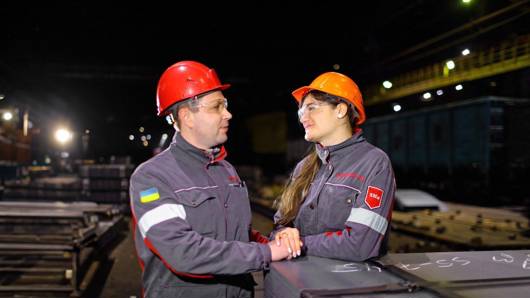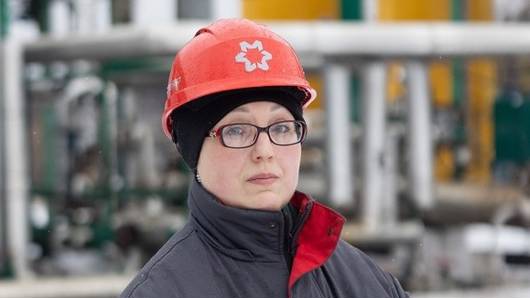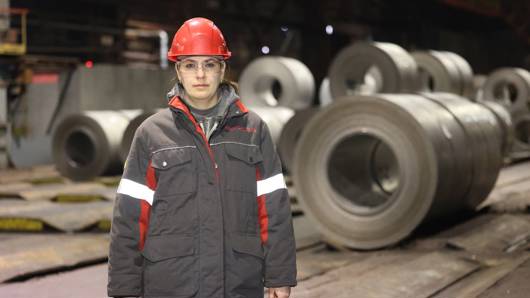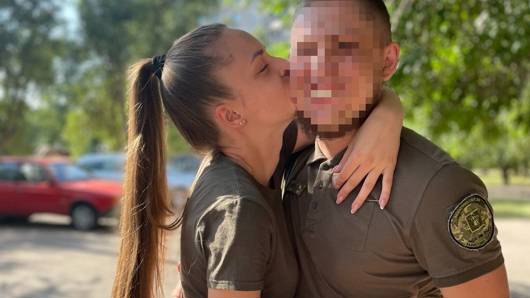His name is Maksym Kryvopyskyi. He is a 4th category turner in the testing shop and has been working at Kamet-Steel for 14 years. At the very beginning of the war, in the spring of 2022, he went to the front, despite all the objections of his family and friends, and refused to take advantage of the legal opportunity to defer. His military profession was a soldier of the Air Assault Forces, call sign "4G". After being wounded, he returned from a place where most of his comrades did not, and considers this to be a gift of fate, for which he must repay with a truly masculine life, in which the main thing is the main thing, and fuss, gossip and trifles are not worthy of attention. At the age of 40, he became a student at a technical university. He values his family above all else. For readers who find this "business card" not enough, here are Maksym's frank answers in the interview.
A few months in 2022 in the 25th separate airborne brigade were probably worth a lifetime. The airborne brigade only sounds intriguing. A soldier, an assaultman who assists a grenade launcher firer, a machine gunner, and in case of emergency, does not hesitate to take his place, risks his life not every day, but every minute. But Maksym's call sign is strange...
"‘4G – where did it come from?"
"It stuck with me from the very first days. Here's the story: we entered the positions near Avdiivka for the first time, and my comrade and I were the first to go through the tree belt. We all switched off our phones because we were warned that a switched-on phone can be easily tracked and will immediately be an incoming strike. So we kept our gadgets in airplane mode. We moved in a special way, in a kind of ‘rolling’. We were hiding under a tree, and he said: "Where are all the boys? We don't want them to pass us by. Dial them." I was dialling, but the phone was switched off. I switched on the ‘plane’ – once, twice, three times, it didn't work, and then I looked – the network appeared. I was so happy: "Oh, 4G is working here!" And at that moment it started – 15-20 metres away, we got three incoming strikes that were so strong. That's how 4G stuck to me.
Later, even to call my wife, I had to move three kilometres away from the position, and only then would I switch on the phone. Then you have a minute and a half: hello, alive and well, kiss and love. And that's it, switch off the phone and get out of there, because it's already coming there. But it was worth it to talk to my beloved brave girl who was waiting for me.
"Surviving the war and returning to civilian life must be a special feeling that changes a person?"
"It is, but it came to me in hospital. During the terrible battle in May, when the ‘orcs’ rushed at us wave after wave and we lost many real wonderful brothers in arms, when the six of us held a circular defence, I did not feel any pain from the wound or contusion on adrenaline. It was only after I was evacuated, after I was in hospital and the doctor let me go home, that I realised I had survived. After I saw everyone in person, when I was able to hug them. That's when the understanding came.
And the children were very happy. I remember my youngest son's first words: "Dad, don't hug so hard". And the eldest was happy like mad. And I was thinking in fragments: "Lucky... I don't know... Lucky..." It was just that I could have been where the bombs were dropping, if I hadn't moved away just a couple of metres or done it a few seconds later. I understand this perfectly well.
My wife thinks I've changed, and others have noticed it too. There was a renewal, a "reboot".
"And what are its triggers?"
"Let's just say that I began to distinguish between justice and injustice more sharply. I became more assertive, learned to go for the goal without looking back. I also took a fresh look at teamwork and how to complete tasks. I used to do them before, but now I try to do them more responsibly, diligently and quickly. I usually say that I'm a lazy person, so I try to do everything right the first time, quickly and efficiently, so that I don't have to redo it later.
After the war, I realised that I need to appreciate and live every day, every hour of my life. Because this day is very expensive, its price is one day of my life. It will never come back, so you have to move forward and develop. You have to live, not just exist.
For example, the other day I officially became a university student, was ‘initiated’ into the university, and received my document. I'm taking a holiday and going to study. Some people, however, do not understand why I need to do this at the age of 40..."
"And you can explain..."
"Why not? 40 is a great age. Some people have become fathers, some grandfathers, and I am a student. The worst thing is when you stagnate in one place, you start to wither. I want to acquire new knowledge, get a degree, develop professionally, move up the career ladder. I need this to develop here, at our enterprise, in our company. The company supported me and my family when I was at the frontline: my wife received humanitarian aid and I received a bulletproof vest. Now I want to do something good for my enterprise and the company.
But my biggest aspiration is to give my children everything I can. And for this, I will do even more than I can. Because for me, my family is my everything. It is the meaning of my life. It was the biggest support there. As a reminder of this, when I came back, I got a tattoo - ‘Hands of Gratitude’. I thank them for everything. My wife gave me an interesting bracelet with the inscription ‘You are our hero, we love you endlessly’, my son Danylo's date of birth, Timofey's date of birth, and the date of our wedding. It was nice."
"You are talking about a new way of looking at teamwork. What is the most valuable thing for you in a team?"
"Support. This is the first thing. Without mutual support, there will be no team, it's not a team anymore, it's everyone on their own. Again, any job, whether it is working on the front line, storming or digging trenches, or performing production tasks at an enterprise, requires a team. To get the job done quickly and efficiently, you need to be confident in your colleagues, know how and what you can rely on them for. Communication, trust and, of course, a strong leader, commander or manager who can lead by example and encourage great teamwork are the key to a team."
"What are you proud of based on your experience?"
"I don't know. I don't think I'm proud of anything. I was just scared, it was very painful, but I'm definitely not ashamed."









